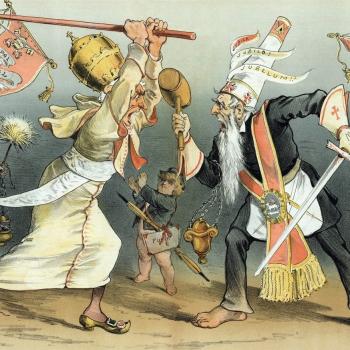
I’m an avid reader. I love to read (but, like most things, how great that love is waxes and wanes, as sometimes I read something which completely enchants me and I can’t wait to read more, and at other times, I find what I am reading not so exciting, making it difficult to reading, that is, when I think there is a good reason to do so).
I try to read at least an hour every day. I consider doing so to be similar to physical exercise, but instead of focusing on my body, I am engaging my mind. Some days I meet my goal, some days I read quite a bit more, and other days, when life gets in the way, I read much less I desire.
While I read a great variety of texts, there are some types which I read more often than others: theology, spirituality, philosophy, history, science fiction, fantasy, and important, influential works of world literature. I try to alternate what I read, especially if and when I find myself reading too much from a single author or genre, just as I alternate the physical exercise I do every day. This helps keep my mind sharp even as it makes sure I do not get stuck in my reading habits, ignoring texts which I would otherwise find invaluable or at least entertaining if I turned to them. Indeed, when I find my reading becomes repetitive, such as when I read too much from a given author or genre, I find my enthusiasm for reading begins to wane. That is when I need something radically different to read, something which, in its newness, helps revitalize my love for reading. After engaging such a novelty, I find it easier to engage the kinds of texts I normally read.
Writing my blog helps me integrate what I have read and learned to what I had previously come to know and understand; that is, I often use the texts I have most recently read as an inspiration for my writing, engaging what I read so that I can better understand and appreciate its significance for myself. This is not to say everything I write about is based upon what I have most recently read: usually, one blog post a week reflects my current reading (if it is relevant), another post reflects the liturgical week and the readings used for the Sunday Divine Liturgy, another engages and reflects upon the news of the week, and then, the final post either deals with concerns I have seen being raised by Catholics during the week, or I try reflect upon the spirituality of the desert fathers and mothers, trying to find a way to make their wisdom and thought relevant today. In doing this, I write for my own benefit, but also, for the benefit of others, hoping that what comes about through my studies and reflections will help others just as much as it does myself.
I do not want my blog to only serve myself and my own particular idiosyncrasies. I try to make my blog a place where I can encounter others, and they can encounter me. I do not always respond to comments, but I read them, thinking about what they say and if there is something I should say in response, either in a comment, or in a future blog post. I try to use my blog as a place where I can engage others, and others engage me. For that to be possible, everyone needs to be honest. If I detect someone trying to simply debate, or worse, respond in some deceptive manner (such as trying to gaslight me or one of my readers), I disengage from that conversation. We should always be concerned about each other, showing each other love and respect, treating each other as we would like to be treated. This includes being willing to open up and expose ourselves in some fashion or another, that is, to be willing to reveal our thoughts and beliefs, so that others can then respond to us in kind, and in doing so, we come to know, not just our thoughts and beliefs, but some of the hopes and dreams and of the people we engage. I want us to have a fruitful encounter with each other where we engage each other as persons and not as mere individuals who have no way to connect or help each other. But, if we are to help each other in this way, we should always make sure we are not being hypocrites, addressing others, telling them what to do without being critical with ourselves, which is why I constantly tell people, much of my writing is as much as for myself as others. It is my hope that my reflections can help us grow together; if this happens, or rather, when it happens, I believe my work has been successful, and when it does not, then I know there is more which needs to be said and done.
To help make this happen, when I read, I write down quotes which I find interesting and important. Some of them confirm what I already believe. Some of them complement and expand my thoughts. Some of them challenge them. Others represent ways authors I am reading, often authors I like or appreciate, go astray or err. The last type of quote is important because it helps me to be critically engaged with what I read, not taking what I read for granted. It reminds me that even those who are intelligent, full of knowledge and wisdom, are people with biases and prejudices which get in the way of their thinking. Many of my favorite authors have made some great, indeed, grave mistakes, and yet, they are among my favorites because where they went right, they said and did something extraordinary, something which amazes me, and so something which influences me and my thoughts. And then, when I think about them and how they went astray, I know the same can and should be said about myself, that is, if the best among us can embrace some grave errs, it is likely I am doing so myself, in ways which I might not ever recognize.
To be sure, what I have written here might seem to suggest that my reading is done purely for study, or some utilitarian use. While that is often involved, it is not the whole of it. Much of my reading is done for the pleasure of it, that is, because I am entertained by what I read. I do not take notes on everything I read, especially if and when I find such notes would become repetitive, or worse, interfere with my enjoyment of the text in question. This is one of many reasons why I like to read fiction, especially genre fiction. It helps me read more for the sake of pleasure than for anything else. This is not to say such reading only serves meaningless entertainment, as, of course, the works not only entertain us, but they also makes us look at and examine the world in new ways. This is why I like to read the works of J.R.R. Tolkien, C.S. Lewis, Philip K. Dick, Frank Herbert, Ursula K. Le Guin, Shirley Jackson, and H.P. Lovecraft (and others like them): they knew how to write to entertain their audience, and yet, in and with that entertainment, there are many issues which are raised, issues which can and should be addressed by everyone, issues which often become addressed either directly or indirectly when I come to write for my blog. For, even when I am being entertained, my mind still asks questions, questions which ultimately will be reflected upon in what I write.
Stay in touch! Like A Little Bit of Nothing on Facebook.
If you liked what you read, please consider sharing it with your friends and family!
N.B.: While I read comments to moderate them, I rarely respond to them. If I don’t respond to your comment directly, don’t assume I am unthankful for it. I appreciate it. But I want readers to feel free to ask questions, and hopefully, dialogue with each other. I have shared what I wanted to say, though some responses will get a brief reply by me, or, if I find it interesting and something I can engage fully, as the foundation for another post. I have had many posts inspired or improved upon thanks to my readers. 

















